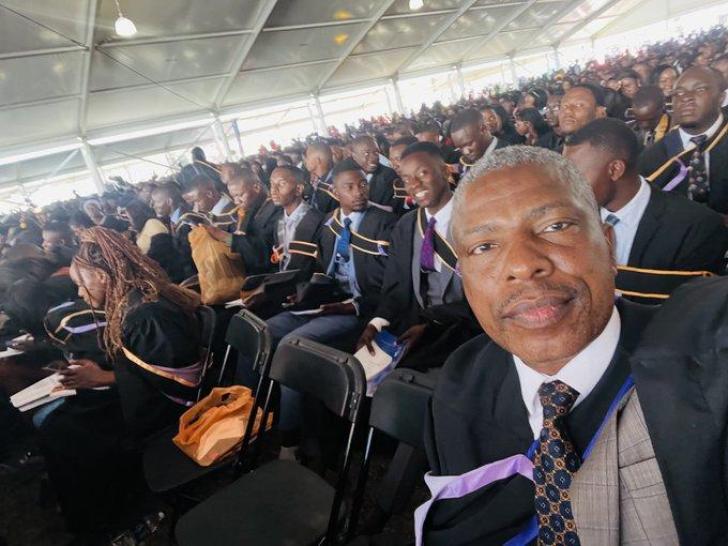News / National
Dexter Nduna law degree under spotlight
15 Sep 2024 at 10:27hrs |
0 Views

The University of Zimbabwe (UZ), a cornerstone of higher education in the country, faced significant controversy during its graduation ceremony on Friday. The celebration of academic excellence was marred by two major scandals involving seven students who graduated with fraudulent results and former Zanu-PF Chegutu West MP Dexter Nduna, who graduated despite failing several modules.
The graduation event, intended to honor the achievements of the institution's students, was overshadowed by allegations of academic misconduct and political interference. Nduna, who is also the chairperson for resource mobilization and revenue generation for Zanu-PF in the central committee, graduated with a Bachelor of Laws degree under contentious circumstances. Reports emerged that Nduna had requested the remarking of all failed modules, claiming political bias and targeting due to his party affiliation. However, this assertion was undermined by the fact that Tafadzwa Mugwadi, a Zanu-PF legislator from Buhera West and former director for information and publicity, graduated without controversy, further fueling skepticism around Nduna's claims.
Social media buzzed with discussions about Nduna's controversial graduation and allegations of political blackmail against UZ lecturers. The scrutiny intensified as it was revealed that seven students had their academic results fraudulently altered. According to sources, these students, who had originally failed their exams, had their results manipulated by lecturers under pressure from the university's academic leaders. Instead of arranging supplementary examinations as per standard procedure, the institution's leadership instructed lecturers to adjust the marks to reflect passes.
Under UZ's academic regulations, students who fail some subjects are expected to either sit for supplementary exams or apply to repeat the failed modules. However, in a breach of these rules, the university's leaders opted to have the results falsified, an act deemed as academic fraud and criminality by critics.
The impact of the scandal was palpable among the graduating students, who expressed outrage upon discovering that their peers, who had failed, were listed among the graduates. The integrity of the graduation ceremony was compromised, with the institution's reputation taking a substantial hit.
President Emmerson Mnangagwa, who officiated over the graduation ceremony, capped 6,778 graduates across various disciplines, including 16 Doctor of Philosophy, 11 Masters in Philosophy, and 5,319 undergraduate degrees. Additionally, 1,432 graduates completed various postgraduate programs. Despite the scale of the event, the controversies significantly overshadowed the accomplishments celebrated.
UZ has faced numerous scandals in recent years, including the issuance of fake PhD degrees, allegations of political interference, nepotism, and corruption. The latest controversies, involving both the fraudulent alteration of academic results and the politically charged graduation of a high-profile figure, have further tainted the university's image and raised serious questions about its leadership and academic standards.
As UZ grapples with these issues, the recent scandals serve as a stark reminder of the challenges facing Zimbabwe's higher education system, calling into question the integrity of academic institutions and the impact of political influence on education.
The graduation event, intended to honor the achievements of the institution's students, was overshadowed by allegations of academic misconduct and political interference. Nduna, who is also the chairperson for resource mobilization and revenue generation for Zanu-PF in the central committee, graduated with a Bachelor of Laws degree under contentious circumstances. Reports emerged that Nduna had requested the remarking of all failed modules, claiming political bias and targeting due to his party affiliation. However, this assertion was undermined by the fact that Tafadzwa Mugwadi, a Zanu-PF legislator from Buhera West and former director for information and publicity, graduated without controversy, further fueling skepticism around Nduna's claims.
Social media buzzed with discussions about Nduna's controversial graduation and allegations of political blackmail against UZ lecturers. The scrutiny intensified as it was revealed that seven students had their academic results fraudulently altered. According to sources, these students, who had originally failed their exams, had their results manipulated by lecturers under pressure from the university's academic leaders. Instead of arranging supplementary examinations as per standard procedure, the institution's leadership instructed lecturers to adjust the marks to reflect passes.
Under UZ's academic regulations, students who fail some subjects are expected to either sit for supplementary exams or apply to repeat the failed modules. However, in a breach of these rules, the university's leaders opted to have the results falsified, an act deemed as academic fraud and criminality by critics.
President Emmerson Mnangagwa, who officiated over the graduation ceremony, capped 6,778 graduates across various disciplines, including 16 Doctor of Philosophy, 11 Masters in Philosophy, and 5,319 undergraduate degrees. Additionally, 1,432 graduates completed various postgraduate programs. Despite the scale of the event, the controversies significantly overshadowed the accomplishments celebrated.
UZ has faced numerous scandals in recent years, including the issuance of fake PhD degrees, allegations of political interference, nepotism, and corruption. The latest controversies, involving both the fraudulent alteration of academic results and the politically charged graduation of a high-profile figure, have further tainted the university's image and raised serious questions about its leadership and academic standards.
As UZ grapples with these issues, the recent scandals serve as a stark reminder of the challenges facing Zimbabwe's higher education system, calling into question the integrity of academic institutions and the impact of political influence on education.
Source - online
Join the discussion
Loading comments…
































